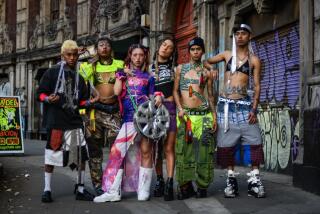Pendleton’s new indie spirit
- Share via
Reporting from Portland, Ore. — — Can Pendleton conquer the hipster class? For many, the brand is associated with career clothes and mom jeans, with Indian blankets and plaid shirts worn by the Beach Boys.
But Pendleton has been working to attract a new generation of contemporary customers for the last few years, collaborating on co-branded clothing with action-sports giants Vans and Hurley, with fashion labels Levi’s and Comme des Garçons, and in 2009, with avant-garde boutique Opening Ceremony.
Now Pendleton Woolen Mills, Oregon’s 102-year-old, dyed-in-the-wool blanket brand, is continuing its move into the boutique fashion business by tapping into the indie cool of Portland, the city that exported Stumptown Coffee Roasters and director Gus Van Sant and inspired the IFC comedy series “Portlandia.”
The Portland Collection will include men’s and women’s clothing, blankets and accessories designed by three designers who came up through the Portland fashion scene. The collection will be introduced — right after Labor Day — in 200 boutique outlets, including select Anthropologie stores, and websites, with prices ranging from about $68 for a necktie to $650 for a coat.
Over the last few years, Portland has hosted a growing creative class attracted to its independent spirit. The weekly Saturday market has a section strictly reserved for vendors who make products locally, such as organic catnip toys fashioned out of recycled men’s pinstripe suits, and garden gnomes sculpted into your likeness while you wait. (Imagine a city as a college campus — bike racks on light rail cars, garbage cans divided for multiple recycling options and an independent bookstore that takes up an entire city block.)
And yet it’s difficult to characterize Portland style. “Upscale work wear” is one description. There are those people who shop only at vintage and Goodwill stores. Others are involved in the fashion industry in varying degrees. (Three winners in eight seasons of “Project Runway” have hailed from the Rose City.) There are designers who make one-of-a-kind items for local boutiques such as Crafty Wonderland, and others with lines sizable enough to sell wholesale at regional trade shows.
The designers working on the Portland Collection — John Blasioli, Nathaniel Crissman and Rachel Turk — have their own indie fashion lines, and have recruited local stylists, photographers and sales representatives to bring a fresh eye to Pendleton.
“The fact that they’ve put together a team of local designers, and that the bohemian aspect of Portland has a certain allure, differentiates the line from the big city fashion brands from New York and Paris,” said Robert Burke, president of fashion consulting firm Burke & Associates. “It makes sense for Pendleton to do a focused collection.... And they’re smart to make the collection at an attainable price point. It has potential in this heritage moment to do well.”
Breaking from Pendleton’s admittedly dependable, if not dopey, image from the past, the Portland Collection has a contemporary fit and urban color palette of muted cream, black, navy, rust and gold. Everything is wool, and for the first year at least, there will be no spring collection.
The clothes nod to the season’s western trend, but in a quirky, alterno kind of way. The Pendleton jacquards, done in black and white, read more graphic and modern than Santa Fe style circa 1990. And the famous plaids aren’t outdoorsy so much as they are nerd-chic.
The designers updated the plaid shirt popularized by the Beach Boys in the 1960s, giving it a slimmer fit, double patch pockets and piping trim, and added the option of wearing a matching plaid skinny tie and an arrow-patterned cardigan on top.
They engineered a jacket in a cream and black Harding jacquard to be reversible, based on a 1930s toboggan coat from the company archives. (The cross-patterned Harding pattern dates to 1923, when President Warren Harding and First Lady Florence Harding visited Portland and were presented with a blanket in the design.)
Other pieces are surprising, including a russet-colored mini-dress with a racer back and a removable shearling neck warmer; and a pair of black-and-white Harding jacquard shorts that would be more at home in a Brooklyn coffeehouse than on a Multnomah Falls hiking trail.
Pendleton, headquartered in downtown Portland, follows several other American heritage brands in looking to the past to forge the future (Lands’ End, L.L. Bean, Woolrich Woolen Mills).
But it has an edge when it comes to storytelling. This fall, when so many designers have mined American Indian patterns for inspiration — Proenza Schouler, Diane von Furstenberg and Isabel Marant to name a few — Pendleton actually has a legitimate link to that culture.
And nostalgia sells. “In a time of fast fashion and constant new trends, the voice of iconic brands is a pleasant reprieve,” said Darcy Penick, divisional merchandise manager of Shopbop.com. “As we return to localization in food and crafts, a renewed love of iconic American brands is a similar revival.”
The tradition of Pendleton began in a weaving mill in Eastern Oregon in 1909, when the Bishop family began producing trade blankets for neighboring Indian tribes. Those colorful, geometric-patterned blankets became popular throughout the U.S. as railroad travel expanded and are associated with Western and Adirondack décor thanks in no small part to Ralph Lauren.
Pendleton expanded into apparel in 1924, when the Pendleton shirt was born. By the 1950s and ‘60s, the company was selling a full range of wool clothing for men and women, including plaid shirts and ‘49er jackets popular with collegians and surfers alike, many of whom discovered the brand at its Frontierland store in Disneyland.
Pendleton remains family-owned into the sixth generation and still produces much of its line in the Pacific Northwest. Its two mills are among a handful that have survived in the U.S., which once had a booming textile industry with nearly 1,000 mills.
“Made in the USA” is a key piece of marketing the Portland Collection, especially in Europe and Asia, said company President Mort Bishop III, who declined to share sales projections. Pendleton has 43 retail stores and a catalog division, though the Portland Collection will not be sold through those channels.
The idea for the collection grew out of a successful string of collaborations that began in 2008 and culminated with a co-branded line with avant-garde Soho boutique Opening Ceremony in 2009. The store’s founders, Carol Lim and Humberto Leon, designed the Pendleton meets Opening Ceremony collection, turning the classic blanket jacquards and plaids into pleated miniskirts and flared peplum jackets commanding prices of more than $1,000.
Opening Ceremony, which also has stores in Los Angeles and Tokyo, not only brought the brand to a new audience, it also gave Pendleton a new sense of itself.
“The Portland Collection was totally inspired by the success of the Opening Ceremony collaboration,” said Jim Buckner, manager for Pendleton menswear and lead on collaborations.
Collaborations, including the one with Opening Ceremony, will be a permanent part of the business going forward, Buckner said. But now, Pendleton is pursuing brands, in addition to being pursued, The latest collaboration is with Worksman Cycles (which has been making bikes in the United States since the 1890s) — a cruiser bike with a frame in Pendleton’s Chief Joseph pattern.
Fresh design inspiration from those partnerships, as well as the pace-setting Portland Collection, is what Bishop is counting on to take Pendleton to the next generation.
“Fashion is much more of a driver for us than it was five years ago,” he said. “We realized for our growth that we needed to go upscale, because we were never going to win the battle on price. And in going through our hundred-year celebration in 2009, when all these people were coming to us for collaborations, we realized we had something special. We were just too close to recognize it.”







